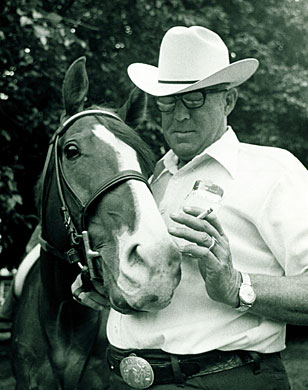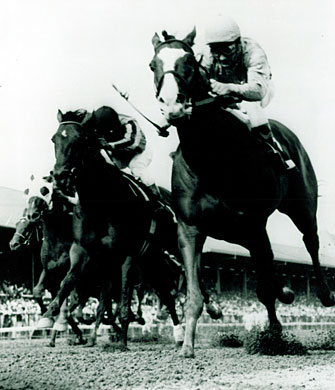The charm of horse racing lies primarily in the animals that do
it—their beauty, grace, power and their degree of class. But there is an
undeniable attraction to the colorful human beings that make it happen.
The purpose of this blog is to share my stories about some of these
characters. My requisites in the selection: I had dealings with them,
their antics and accomplishments should not be forgotten, and that at least most of them are
no longer with us. — Cot Campbell
The
nicest compliment I ever received came from big, blustery Doug Davis, a
horseman's horse trainer.
Perhaps
the nature of the compliment will indicate that I have been pitifully desperate
for kind words. But I loved it.
In my
early years in the horse business, I found it quite expedient to buy horses on
terms. Oversimplified, this means I bought the horse by paying one-third of the
purchase price down, took possession of the animal, and deferred the balance
over two payments six months apart. This was unheard of in this industry when I
first started doing it. I could do it because I had earned a good reputation. Any
deviations from the payment schedule would be in favor of the seller. I saw to
that.
One year
in a horses-of-all-ages paddock sale at Saratoga, Doug Davis was selling (on
behalf of his major patron) a good race filly named Jill the Terrible. She
figured to be pricey, but I wanted to buy her. Before the sale I asked the
owner, whom I knew only slightly, if he would provide me with terms if I were
the successful bidder. He was a little skittish about this, hemmed and hawed,
and said he'd have to think it over and get back to me.
Later
that day, this fellow walked up to me and said, "I asked Doug Davis if he
thought I would be safe in selling that filly to you on terms. Doug told me,
‘Well, I just wish that son of a bitch owed me a quarter of a million dollars!'
"
From
that day on, I've had a warm spot in my heart for Doug Davis.
Doug had
style, presence, and charisma. When he walked into a room, you knew he was
there. He made any gathering more interesting. He was a big man with a
thunderous voice and a gaudy appetite for life.
As a
child he must have been influenced by Tom Mix or Hopalong Cassidy because he
went "western" all his life. When he died, his estate included 75 pairs of
cowboy boots and 60 cowboy hats.
Until
Wayne Lukas wrested the title away, Doug Davis was the winningest trainer in
Keeneland history. This was accomplished when Keeneland certainly offered fine
racing, but was not as stylish as it is today. Doug was predominantly a
"Midwestern" trainer. He seldom ventured to big-time tracks in New York,
Florida, or California. He had mostly Grade B stock, much of which he bred from
Hempen, a stallion owned by Davis and known for throwing speed and precocity.
 Doug Davis with Annihilate 'em
Doug Davis with Annihilate 'em But Doug
trained many stakes winners, one of which went to Saratoga and jerked a knot in
the best of the Eastern stock in the prestigious Travers Stakes. This was
Annihilate ‘em. He had big speed and was able to carry that speed over a
distance.
When the
colt got good, Doug loaded him up in a gooseneck trailer, threw in Charlie, his
famous and remarkable stable pony, and a few more runners, and headed up to the
Spa.
This
entourage created a bit of a reaction at Saratoga. In the first place,
gooseneck trailers were not de rigueur
at Saratoga. Doug himself went over with "the Establishment" like a bastard at
a family reunion, and on top of that, he had a stable pony that actually
functioned without a bridle!
I must
admit, the first time I ever saw Charlie smoothly shepherding a jittery runner
to the post, I was flabbergasted. Charlie was equipped with not one bit of
leather from his shoulders forward and depended entirely on his own incredible
savvy and an occasional bit of knee or heel pressure (or mental telepathy!)
from the rider.
The
Saratoga outriders and stewards were aghast when Doug came on the track the
first morning. Astride the seemingly nonchalant and bridleless Charlie, the old
Kentucky boy was taking Annihilate ‘em out for a gallop several days before the
Travers.
An
outrider came loping up to this strange little group and said, "You'll have to
get that pony off this racetrack. He hasn't got a bridle on!"
Doug
explained, "Aww, I know, but he's fine. Charlie don't like anything around his
head." He thought that would take care of the intrusion.
"Off!
Right now! We're not going to have lead ponies out here with no bridles on
them. We've got the safety of the racetrack to consider. Go borrow another lead
pony," the outrider firmly ordered.
Doug was
not one to duck a confrontation. He shot back, "Well, this lead pony has forgot
more about racetrack procedure than all the damned outriders and stewards in
New York State will ever know. If this pony goes, I go, and so does this horse
that come here to run in the Travers." Doug turned his caravan and headed back
to the barn.
He was
loading the gooseneck a few minutes later when up hustled a steward and said
that they had decided to make a dispensation. Charlie (without a bridle, of
course) could escort Annihilate ‘em on the racetrack and to the post for the
Travers.
The
press had a field day with this brouhaha.
About
five o'clock three days later the odd couple, Annihilate ‘em and Charlie, were
the featured attraction in the post parade. Every eye was glued on them.

Annihilate 'em winning 1973 Travers Stakes
Annihilate
‘em easily won the 1973 Travers, but it was almost anticlimactic to the post
parade featuring the Kentucky horse's bridleless escort. The colt's victory
finished off properly one of the most colorful chapters in the history of that
fine race.
Saratoga
lore will always maintain a prominent spot for Annihilate ‘em. And Doug Davis. And
for Charlie-just a working guy who "didn't like anything around his head."
While he
was for many years the winningest trainer at Keeneland, one year, despite
running two or three horses every day, Davis did not win a single race.
In
racing, a "duck" (yes, a fowl!) is presented to the trainer who finishes the
meeting without a single winner to his name. I don't know the reason for this
custom. But there is always a lot of chortling around the racing secretary's
office about whether so-and-so (ideally a high-profile trainer!) "is going to
get the duck."
This
particular year Doug had slightly aroused the ire of his good friend and
longtime training competitor, Herb Stevens-a crusty citizen and bona fide
character in his own right.
Early in
this Keeneland meet, Herb had entered a first-time starter in a maiden claiming
race. Much to Herb's surprise, Doug claimed him. While this action did not
enrage Herb, it did get his attention. After the race, when the horse was
ensconced in his new barn, Doug came running over to his pal Herb and said,
"Herb, I couldn't help it. This damned owner of mine out in Arkansas made me
claim that horse. I didn't want to."
Herb
said later, "I didn't care about losing the horse, but it made me mad as hell
that Davis would think I was dumb enough to believe that cock-and-bull story."
On
closing day at Keeneland, Doug had three runners. The first two ran in early
races and failed to hit the board, and now he had one last chance, in the last
race.
Herb
Stevens had, of course, been keeping tabs on the big guy, and he was not
pulling for Doug to mar his winless record by knocking off the 10th and last
race.
About
mid-afternoon Herb strolled into the secretary's office. The staff had
purchased and put on display a life-sized, lawn ornament-type duck, to be
presented to Davis, if he kept his dismal record unscathed in the last race.
Herb
said, "Give me that damned duck! I'm gonna make
this presentation."
He then
alerted the press box, the track photographer, and anyone else he could think
of to be in the Keeneland walking ring for a very meaningful ceremony. He
arranged for several other fellow trainers-individuals who would tend to enjoy
the nature of the project-to grab Davis after the last race (if indeed, he did
not win it) and escort him to the ceremonial site.
The
training fraternity got the exact result it desired: Doug's horse did not even
threaten. So Doug was steered, almost forcefully, back to the walking ring.
There,
gleefully assembled were every racing writer in central Kentucky, a variety of
photographers, most of the staff of Keeneland, and a sizeable group of curious
racing fans now exiting the track past the walking ring. It was a splendid
crowd, and in the middle of it was Herb Stevens with the duck-on a leash!
Accompanied
by lusty jeering, Stevens dealt thoroughly with Davis' lack of accomplishment
at this Keeneland meeting, made the presentation, and concluded with, "Now,
Doug, this makes us even!"
A
resulting photograph of Doug, staring balefully down at the duck he held on a
leash and clearly at a very unaccustomed loss for words, is a classic. It still
hangs on the walls of several racing secretary offices and press boxes at
tracks where Doug Davis plied his trade.
It may
have been the only duck Doug Davis ever received.




